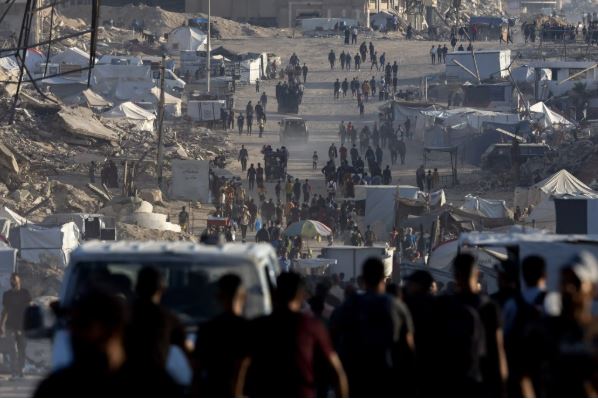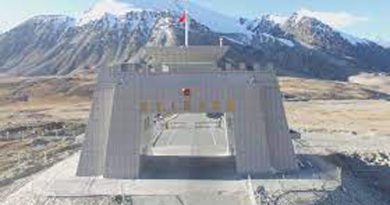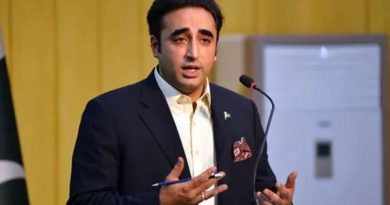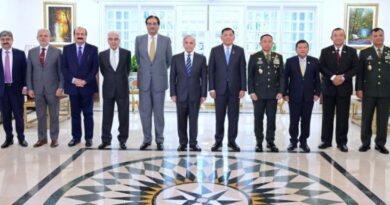Speakers at IPS seminar say Israel wants to weaken Iran, divert global attention from Gaza situation
ISLAMABAD: In the context of the Iran-Israel conflict, Pakistan will
have to adopt a cautious and diplomatic strategy, keeping in mind its
historical relations and the changing alignment in the region.
The Israeli aggression against Iran is not sudden, but rather a
reflection of deep and long-standing strategic planning and
geopolitical dynamics. With American backing, Israel wants to
eliminate Iran's regional capabilities and importance, while Iran is
expressing its strategic autonomy and ideological position.
The rising tensions between Iran and Israel will not only push the
region towards further instability, but it is also an attempt to divert
global attention from the ongoing humanitarian crisis in Gaza.
Pakistan will have to adopt a cautious and diplomatic strategy,
keeping in mind its historical relations and the changing alignment
in the region.
These views were expressed by the speakers at a discussion titled
“Israeli Aggression on Iran and Middle East Dynamics” organized by
the Institute of Policy (IPS) in Islamabad. IPS Chairman Khalid
Rehman, IPS Vice Chairman former Ambassador Abrar Hussain,
former Ambassador Nasrullah Khan, former Ambassador Rifat
Masood, former Ambassador Naila Chauhan and Brigadier (retd)
Tughral Yameen spoke in the discussion.
The discussion highlighted the historical aspects of Iran-Israel
relations. Former Ambassador Naila Chohan said that during the
reign of the Shah of Iran, the relations between the two countries
were based on cooperation, when Iran’s nuclear program was
launched with the support of the United States.
However, after the 1979 revolution and the change in ideological
trends in Iran, its opposition to the two-state solution to the
Palestinian issue and its strong stance against Israel’s expansionist
agenda made Iran a key adversary in Israel’s strategic thinking.
The speakers said that as the Abraham Accords show, Israel aims to
gain the support of all Middle Eastern states and expand its
influence in the region. Iran is a major obstacle to this agenda. With
its high literacy rate, developing scientific capabilities, and abundant
natural resources, Iran has the potential to emerge as a powerful
base in the region.
Former ambassador Rifat Masoud said that Israel's main goal is to
weaken Iran's capabilities by bringing about regime change and
halting its nuclear development. He said these efforts continue
despite Iran's non-compliance with the Nuclear Non-Proliferation
Treaty (NPT). is a signatory and does not have a nuclear weapons
program. Former ambassador Nasrallah Khan said that Iran is
discriminated against in the NPT, which indicates a deep distrust of
the West.
He said that Israel’s objectives in the region are similar to those of
the United States, although the two countries have different
strategies. Nevertheless, the United States seems uncertain about its
behavior in the Middle East, while Israel faces resistance and
strategic setbacks, because both misjudged the severity of Iran’s
response.
Khalid Rahman said that the attack on Iran and the ensuing
escalation are not only a source of tension in the region, but are also
a deliberate move to divert attention from the ongoing
humanitarian crisis in Gaza. It is being played up in the headlines to
divert the attention of the international media from the Israeli
aggression and the suffering of the Palestinians.
The speakers said that this war between Iran and Israel is unlikely
to last long, as Israel has suffered an unexpected setback from Iran's
reaction. Although Israel is pursuing Zionist ambitions such as
"Greater Israel", unlike Israel, Iran is strong due to its identity,
solidarity and its importance in the region, Iran has the ability and
determination to withstand pressure.
Regarding Pakistan’s response, Brigadier (retd) Tughraul Yameen
said that the Pakistani leadership has adopted a cautious approach
in this conflict. Considering Iran’s support during the 1965 war and
India’s growing ties with Israel, Pakistan will have to demonstrate
diplomatic sensitivity in any regional conflict.
Former Ambassador Abrar Hussain reinforced this idea, saying that
Pakistan is clear in its position that it supports Iran against Israel, as
it is also a strategic necessity. He stressed on working strategically
with foresight to protect national interests.–NNI



